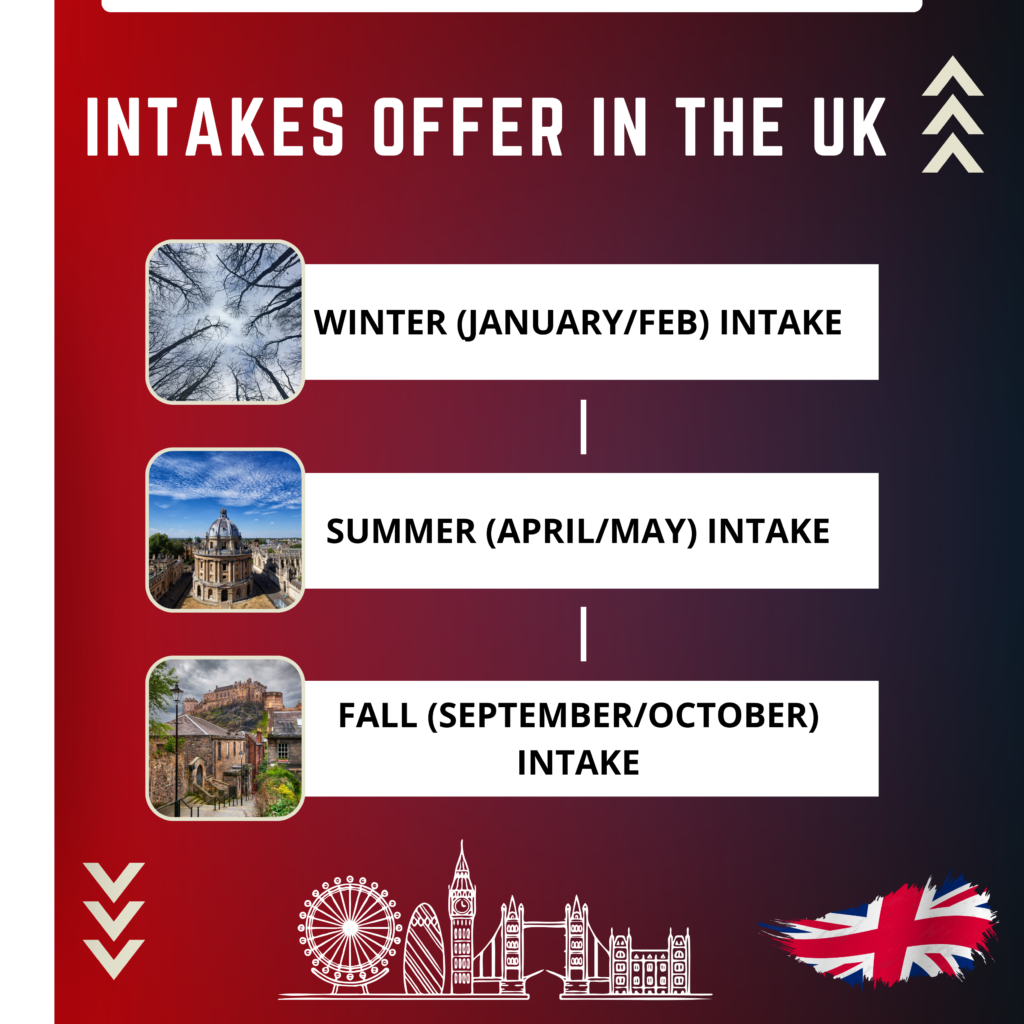UK is a preferred study location for international students due to its numerous highly regarded universities and colleges, as well as the degree’s international recognition. Intakes in UK universities fluctuate throughout the year based on the degrees offered and the prerequisites for admission.
In the UK, there are primary two intakes per year: January and September. A few UK universities also offer certain courses with a May intake. In this blog, learn everything to know about the three intakes—fall, winter, and summer/spring—as well as how to apply and what documents is needed for applying.
In below table, have a look at types of intakes and the duration:
|
Term |
Intakes |
Time frame |
Application starts |
|
Term I |
September (Fall) |
September to December |
December to July |
|
Term II |
January (Winter) |
January to April |
September to November |
|
Term III |
May (Spring) |
May to August |
October to November |
Intakes Offer in the UK:
There are three primary intakes offered by UK universities for students to start their degrees:

- Winter (January/Feb) Intake
- Summer (April/May) Intake
- Fall (September/October) Intake
Some universities also provide a limited course offering for a third intake in April or May. Although the September/October intake is the most popular, there are just as many courses available in January/February. Applying for the January/February intake can be a useful choice for individuals who were unable to make it into the September/October intake, as it gives them more time to concentrate on their applications and fill in any holes in their profile.
UK Intakes Deadline:
The admission cycles that UK universities and colleges run throughout the year are displayed in the table below. Any of these three entry intakes is open to international students wishing to study in the UK.
|
Intakes |
Type |
Deadline |
|
Fall (September) |
Primary |
February- May |
|
Winter (January) |
Secondary |
June- September |
|
Spring/ Summer (May) |
Least favored |
January- February |
1. January (Winter Intake):
The winter intake begins in January. In the UK, it is the second kind of intake. Applications are only accessible for a limited number of courses at universities. Even though there may not be as many alternatives as there were for the September intake, some candidates and students choose this session.
Applications for this intake usually close in September, having opened by June of the preceding year. Let’s now examine the UK universities that will be accepting applications for the winter intake of this year’s school year.
Benefits:
- Students who were unable to submit their applications by the Fall intake deadline , have another chance during the Winter intake.
- Without taking a year off, students can make up in their coursework.
- As studies begin considerably later in the year, students have more time to get application ready.
- Acceptance is significantly easier because there are less applicants than Fall intake.
Best Universities for January Intake:
The list of UK universities offering January/February intake is provided below.
|
Universities |
|
University of Brighton |
|
Oxford Brookes University |
|
University of Lincoln |
|
Keele University |
|
City University of London |
|
Birmingham City University |
|
University of Greenwich |
|
Coventry University |
|
University of Sunderland |
|
Aston University |
|
De Montfort University |
|
University of Essex |
|
Kingston University |
2. May intake in UK:
Since most students would rather take a spring break, the least popular admission cycle in the UK is May intake, sometimes referred to as the Spring intake. On the other hand, this also implies that there is less rivalry and a greater likelihood of acceptance for applicants. Not all schools and universities offer this intake, so those who intend to begin their higher education in May should apply as early as possible—ideally in January or February.
Benefits:
- Because the start date in April/May falls during spring break, students in the UK are less likely to participate in the summer intake.
- Early academic completion may result in cost savings on living expenses and a quicker start to a profession.
- During this time of intake, summer vacation is offered.
- Less competition exists since fewer students apply for the May intake, increasing the likelihood of acceptance.
- Less applications equals fewer students in each subject and more faculty attention.
Best Universities for May Intake:
The list of UK universities providing May intake is provided below.
|
Universities |
|
University of Kent |
|
Brunel University |
|
University of Bedfordshire |
|
Coventry University |
|
Salford University |
|
University of Chester |
|
West of Scotland University |
|
Keele University |
|
Ulster University |
|
Richmond University of London |
|
Sheffield Hallam University |
3. September (Fall) Intake:
In the UK, the intake in September or October is called the fall intake. The biggest intake in the UK is held in September, when institutions hope to draw in a lot of applications from overseas students. Because this intake is preferred by scholars abroad, it offers a wide selection of courses. Applications for this intake are accepted from February to May, though this can vary depending on the degree and the university. In the UK, this intake is also known as the fall intake.
Since September marks the start of the academic year in the UK, the biggest number of admissions occur during this intake. Because this intake offers a wide variety of undergraduate and graduate course options, over 80% of UK applicants prefer it. It fits in perfectly with the global academic calendar, making it a great option for students.
Benefits:
- In the UK, the main and most well-liked intake is the fall one.
- During this intake, many universities accept applications for a sizable number of courses.
- Fall intake, when most programs are offered, gives candidates ample time to become ready for applications.
- Students can participate in a highly competitive atmosphere and have access to a wide choice of internship and employment options after completing the course.
- Students can select from a variety of universities and course options as intakes begin in September.
- The greatest number of scholarships and bursaries are available for fall entry, which is a great opportunity to save money.
Best Universities for September Intake:
The list of UK universities offering September intake is provided below.
|
Universities |
|
University of Bradford |
|
Swansea University |
|
University of surrey |
|
Keele University |
|
University of Derby |
|
Kingston University |
|
University of Westminster |
|
London Metropolitan University |
|
University of Liverpool |
|
Coventry University |
|
University of Exeter |
|
Aston University |
|
University of Cambridge |
|
Brunel University |
|
University of Central Lancashire |
|
King’s College London |
Intakes for masters in UK:
There are three primary university admissions intakes in the UK, with January and September being the most sought-after for master’s degrees. Additionally, several colleges accept applications for master’s programs in May. Candidates can apply to over five universities and maintain options open by applying in January or September. For students looking to pursue a master’s degree, the January and September intakes are often the greatest options because most prestigious universities offer admissions during these times.
Also Read: Masters in UK-Top Universities & Eligibility Criteria
Steps to apply in UK universities
Check out the below steps for applying:
Step 1: Make a shortlist of colleges and courses.
Several considerations, including course content, location, university ranking, tuition costs, and scholarship opportunities, should be considered while shortlisting courses and universities. It’s crucial to verify the prerequisites for every course and university, as they could change area of interest and study level. To assist in compiling a list of possible choices, use tools such as course finders, rankings, and university websites.
Step 2: Confirm Deadlines:
Once narrowed down the selection of universities, be sure to record the deadlines for each application. It’s crucial to confirm the dates as these deadlines may differ based on the university and program. Any other deadlines, such those for scholarship applications, should also be considered, so make plans appropriately. It is advisable to apply as soon as possible because it will allow more time to finish all the requirements, such as lodging and visa applications.
Step 3: Complete Admission Exams:
International students must complete an English language competency exam, such as the TOEFL, Duolingo, or IELTS, to enroll in most UK universities. Depending on the degree, some colleges could also demand that applicants take a standardized exam like the GMAT, GRE, or LNAT.
Step 4: Gather the documents:
Start assembling all the necessary paperwork as soon as students are aware of the entry requirements and deadlines for the university/college they have selected. These could consist of financial records, recommendation letters, a statement of purpose, academic transcripts, and evidence of English language ability. It is imperative that student thoroughly review the prerequisites for every university and program, and promptly submit all required documentation.
Step 5: Open the Application and Begin:
Once all paperwork is assembled, candidate can start the application procedure. While some colleges only accept direct applications, others require applicants to use the UCAS system. Pay close attention to the directions and make sure to include all the required data, such as academic history, personal information, and supporting documentation. It’s crucial to submit the application prior to the deadline and to consistently monitor email for any updates or requests for more details.
Step 6: Acceptance and Offers:
One or more institutions may provide offers to applicant once they submit the application. Spend some time carefully reviewing the terms and conditions. To guarantee the spot, students might be required to pay a deposit, so be sure to arrange the budget appropriately.
Step 7: Get Ready to Enter the United Kingdom:
It’s critical to get ready for arrival in the UK as soon as applicant accept an offer. This may involve arranging housing arrangements, getting overseas health insurance, and submitting an application for a student visa.
Documents Required:
Applicant must gather and prepare a few required supporting documents if they are an international applicant to a UK university. Among them are:
- Complete application
- Application cost
- High school diplomas, degrees, or academic records
- Resume/CV
- 2–3 Statement of Purposes (SOPs)
- Three LORs (Letters of Recommendation)
- Minimum scores on standardized tests (e.g., GMAT, TOEFL, IELTS, GRE, etc.)
- UK student visa application or permit
- Documents related to immigration (passport, evidence of national identification)
- Evidence of financial accessibility
- Health insurance (if necessary)
- GMAT, GPA, or GRE results
- Work history (if any)
Prior to departure, make sure students have all the required paperwork in order.
Scholarships in the UK:
These are the great way to reduce the cost of study abroad. Applicants can apply for several scholarships in the United Kingdom. Below is the list of the scholarships offered by the organizations such as:

|
Scholarships |
|
Commonwealth Scholarships & Fellowships |
|
Chevening Scholarships |
|
GREAT scholarships |
|
Global Study Awards |
|
Erasmus Mundus |
|
Scotland’s Saltire scholarships |
|
Rhodes Scholarships |
Not sure which intake to apply for? If you’re still unsure about when to apply to universities for study in the UK, meet our experts at DY Immigration and they’ll give you all the advice you need to get into your ideal university in the UK!
FAQ
Q1. In the UK, how many intakes are available?
Ans: In the UK, there are three intakes: September, January, and May.
- First Term: September–December
- Term 2: March through April
- Third Term: April–June
Q2. What makes the September intake superior to the others?
Ans: In the UK, the main intake is September or the fall. As a result, numerous universities receive a large volume of applications for different courses. In addition, after students finish their education, there will be fierce competition and more internship and job opportunities.
Q3. Does the UK require IELTS?
Ans: Indeed. Studies in the UK require the IELTS exam. It is necessary to turn in the results because the IELTS is one of the examinations for English language competency. Applicant must take the IELTS UKVI academic to study at a UK institution.
Q4. Which UK intake is the best?
Ans: Due to the abundance of undergraduate and graduate courses offered, overseas students choose the September admission/fall intake in the UK as their preferred academic window. More than eighty percent of applicants have decided to study in September.


